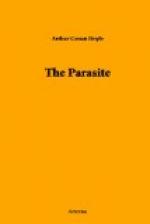And why should I not investigate it? I see that under yesterday’s date I said: “If I could see something positive and objective, I might be tempted to approach it from the physiological aspect.” Well, I have got my test. I shall be as good as my word. The investigation would, I am sure, be of immense interest. Some of my colleagues might look askance at it, for science is full of unreasoning prejudices, but if Wilson has the courage of his convictions, I can afford to have it also. I shall go to him to-morrow morning— to him and to Miss Penclosa. If she can show us so much, it is probable that she can show us more.
II
March 26. Wilson was, as I had anticipated, very exultant over my conversion, and Miss Penclosa was also demurely pleased at the result of her experiment. Strange what a silent, colorless creature she is save only when she exercises her power! Even talking about it gives her color and life. She seems to take a singular interest in me. I cannot help observing how her eyes follow me about the room.
We had the most interesting conversation about her own powers. It is just as well to put her views on record, though they cannot, of course, claim any scientific weight.
“You are on the very fringe of the subject,” said she, when I had expressed wonder at the remarkable instance of suggestion which she had shown me. “I had no direct influence upon Miss Marden when she came round to you. I was not even thinking of her that morning. What I did was to set her mind as I might set the alarum of a clock so that at the hour named it would go off of its own accord. If six months instead of twelve hours had been suggested, it would have been the same.”
“And if the suggestion had been to assassinate me?”
“She would most inevitably have done so.”
“But this is a terrible power!” I cried.
“It is, as you say, a terrible power,” she answered gravely, “and the more you know of it the more terrible will it seem to you.”
“May I ask,” said I, “what you meant when you said that this matter of suggestion is only at the fringe of it? What do you consider the essential?”
“I had rather not tell you.”
I was surprised at the decision of her answer.
“You understand,” said I, “that it is not out of curiosity I ask, but in the hope that I may find some scientific explanation for the facts with which you furnish me.”
“Frankly, Professor Gilroy,” said she, “I am not at all interested in science, nor do I care whether it can or cannot classify these powers.”
“But I was hoping——”
“Ah, that is quite another thing. If you make it a personal matter,” said she, with the pleasantest of smiles, “I shall be only too happy to tell you any thing you wish to know. Let me see; what was it you asked me? Oh, about the further powers. Professor Wilson won’t believe in them, but they are quite true all the same. For example, it is possible for an operator to gain complete command over his subject— presuming that the latter is a good one. Without any previous suggestion he may make him do whatever he likes.”




